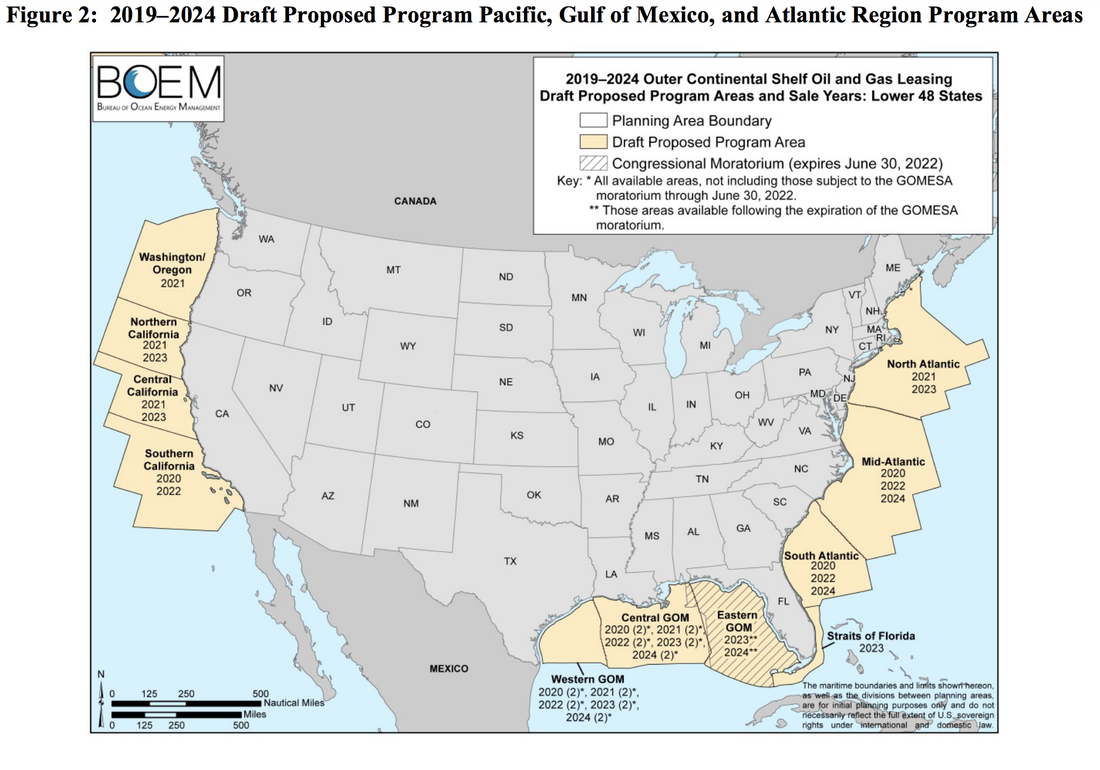|
In an unprecedented move, the Trump administration unveiled a proposal Thursday which could expose the entire US coast to economic and environment catastrophe by permitting drilling in virtually all U.S. continental shelf waters, including protected areas of the Arctic and the Atlantic. "This is a radical plan that will increase the risk of disasters in all US coastal areas," said Tim Dillingham, Executive Director of the American Littoral Society, which is based on Sandy Hook, NJ. "Only a few years ago, common sense and bipartisan opposition ended a plan to open the Atlantic to drilling. Now, despite objections from even the US military, the Trump administration is jeopardizing millions of jobs and economies that contribute billions to the US GDP with a plan to not only offer leases in the Atlantic, but also open the Arctic and Pacific coast to drilling." In announcing the plan, Secretary of the Interior Ryan Zinke said: "Responsibly developing our energy resources on the Outer Continental Shelf in a safe and well-regulated way is important to our economy and energy security, and it provides billions of dollars to fund the conservation of our coastlines, public lands and parks."
However, the drilling plan comes on the heels of a separate proposal to repeal offshore drilling safety regulations that were put in place after the 2010 Deepwater Horizon oil rig disaster. The decision to rollback those safety regulations, which came on Dec. 28, 2017, starkly indicates that only lip service will be paid to environmental, economic or human safety. The US gulf coast is still recovering from damage done by the Deepwater Horizon explosion and spill, which dumped 215 million gallons of crude into the Gulf of Mexico. Pollution from that event fouled beaches from Louisiana to Florida and is still affecting marine life in the area. This plan would expose the entire US coast to similar dangers and is an unacceptable risk to local communities, their coastal economies and marine life. "There should be no doubt that from the halls of Trenton, to the beaches of Sandy Hook, New Jersey's citizens want our ocean protected, not opened up to industrialization and pollution," said Dillingham. New Jersey alone generated $8.3 billion toward the US GDP and supported 124,000 jobs through economies dependent on a clean ocean and coast: fishing, tourism, recreation. A spill could also put the state's $700 billion in coastal properties at risk. "There's simply a blind spot to anything other than the oil industry's desires," Dillingham said. "Where we drill, we spill. And this administration shows little interest in requiring the oil industry to act responsibly. "Too much is at stake to risk our ocean's health," Dillingham said. This sentiment is shared by lawmakers and citizens over the entirety of the Atlantic coast. New Jersey Governor Chris Christie, who campaigned for the current president, reaffirmed his opposition to any industrialization of the New Jersey coast, by having Bob Martin, Commissioner of the NJ Department of Environmental Protection, write a letter to the Trump administration opposing Atlantic coast drilling. "Weighing the potential negative impacts to New Jersey's natural resources, coastal communities, and economy with the potential for energy generation and current energy needs, the State of New Jersey opposes any portion of the North and Mid-Atlantic Ocean being included in the development of a National Outer Continental Shelf Oil and Gas Leasing Program," Martin wrote. According to the environmental organization Oceana, as of November 2017, 141 East Coast municipalities and over 1,200 local, state and federal elected officials including the Governors of New Jersey, Delaware, Maryland, Virginia, North Carolina and South Carolina, have formally opposed offshore drilling and/or seismic airgun blasting. Numerous fishing and tourism interests, including local chambers of commerce, tourism and restaurant associations, and an alliance representing over 41,000 businesses and 500,000 fishing families from Florida to Maine, also oppose oil exploration and/or development in the Atlantic. The South, Mid-Atlantic, and New England Fishery Management Councils have all expressed concerns about the risks posed by seismic surveys and oil and gas development to managed resources, fisheries and coastal communities along the Atlantic coast. Finally, NASA, the Department of Defense, and the Florida Defense Support Task Force have all expressed concerns about expanded offshore oil and gas development threatening their ability to perform critical activities. Opposition to this plan still matters. This proposal is only the first step in a multi-year process to create a National Outer Continental Shelf Oil and Gas Leasing Program. The American Littoral Society stands with those around the United States who oppose this dangerous proposal and encourages its members and supporters to tell their elected representatives that America's publicly owned waters should be conserved and protected, not turned over to the oil industry and the highest bidder.
Gary Rabinowitz
1/10/2018 02:34:17 pm
I have lived in NJ for 62 years. Growing up in Lakewood and practically living around and on our beaches throughout the springs and summers. This past summer I introduced my 3-year old grandson to the beaches, ocean and amusements. I cannot imagine not having those special times in the future due to some environmental mistakes made by those who discounted those mistakes similarly made by "experts". DO NOT let them drill off our coast. We cannot afford to allow any kind of drilling. Comments are closed.
|
Archives
July 2024
Categories
All
|


